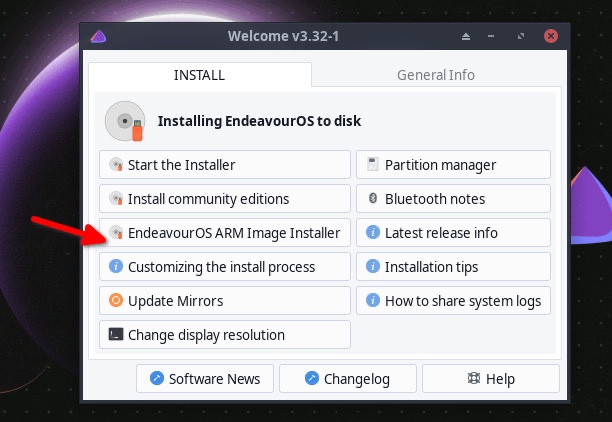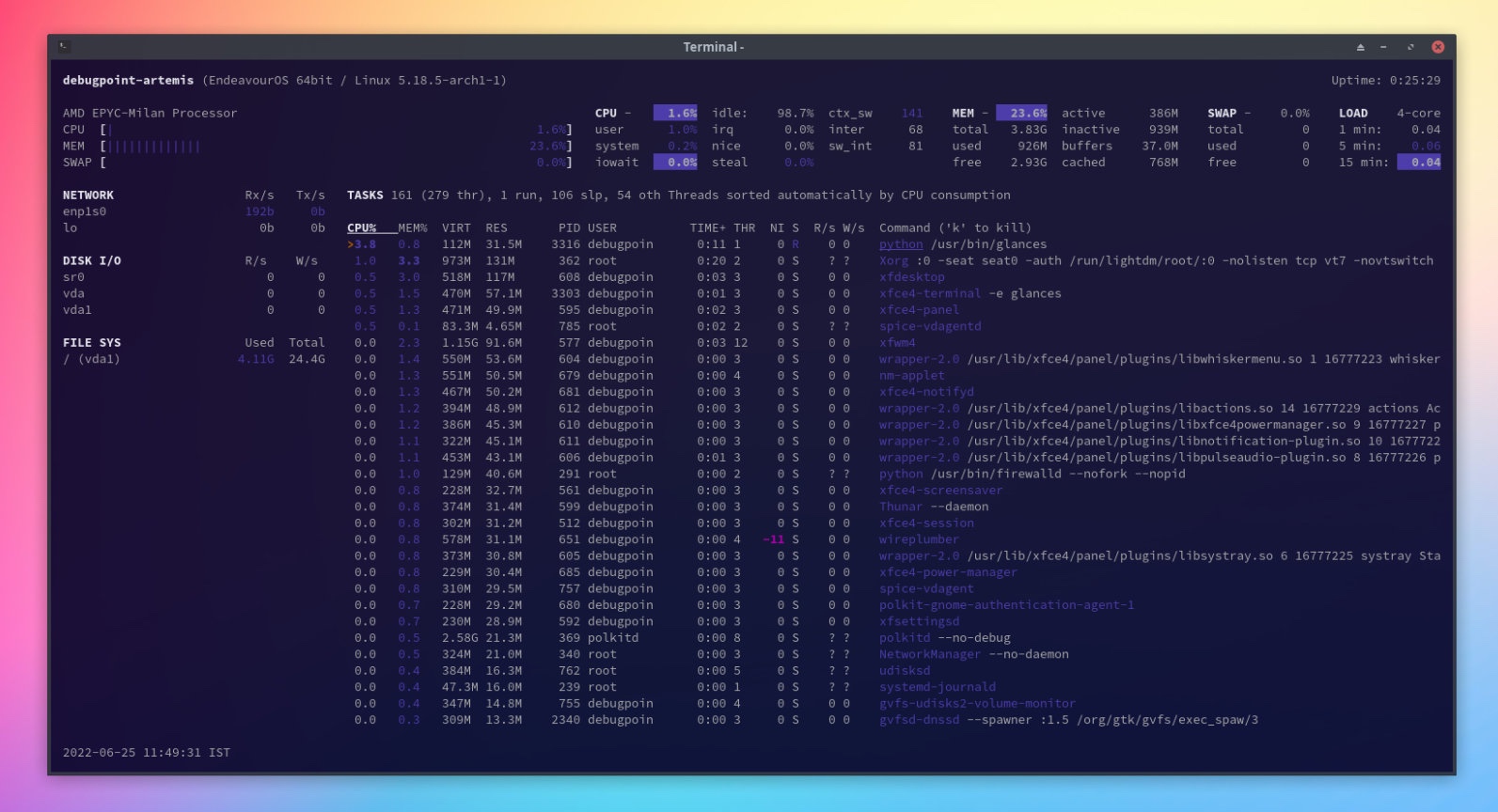EndeavorOS Artemis 22.06 released, bringing better ARM support

EndeavourOS Artemis Released: 22.06
EndeavourOS The Artemis version (22.06) is named after NASA’s upcoming lunar mission “Artemis” , brings regular Arch Linux updates to this great Linux distribution.
ARM UPDATE
In 2020, the EndeavorOS team released their long-sought ARM version for the first time. The goal is to provide users with a stable ARM variant distribution based on Arch Linux that focuses on "friendliness" and "functionality." In 22.06, the ARM ISO is considered the "closest to an official release".
In this monthly update, the Calamares installer is introduced as an important change to the ARM installation process. ARM installation shortcuts are housed within its iconic “Welcome” application.
 EndeavourOS Artemis provides better ARM accessibility
EndeavourOS Artemis provides better ARM accessibility
However, the Calamares installer on ARM is still in beta. Please be careful when installing. Currently supported devices are Odroid N2/N2 and Raspberry Pi.
In addition, we have fine-tuned the desktop environment and packages installed by ARM to synchronize with upstream. Therefore, you get the latest and greatest software on your Raspberry Pi device.
Other changes
EndeavourOS version 22.06 not only contains the updated Linux kernel 5.18.5, but also brings other changes. As of this writing, Linux kernel 5.19 has not yet been released. Therefore, this version may be included in the ISO update of the next great release.
Other notable changes in this release include replacing pipewire-media-session with wireplumber and code cleanup for Xfce offline installations. Additionally, the famous Budgie Control Center is now available in the Budgie version of the distribution, providing a native Budgie experience.
To summarize, the main changes in this version are as follows:
- ARM ISO is closer to the main release version
- The Calamares installer can be used in ARM installation
- Linux Kernel 5.18.5
- Xfce version 4.16 (Ultimate) gets installer code cleanup
- Budgie Control Center is now available in the EndeavorOS repository
- Online Provides better control of keyring synchronization issues before installation
- Added support for downgrading packages - eos-downgrade
- Firefox 101.x
Simple review
We tested this distribution in a virtual machine environment. The offline installation package size of Xfce is 1.8 GB, and the installation process went smoothly. Mirror next week very fast.
First of all, Pay Live
Secondly, the installation through Calamares was very smooth. The recently released "archinstall" makes installing Arch Linux a breeze. I must say that EndeavorOS is evolving into something akin to “Linux Mint” within the Arch Linux community.
After the installation is complete, the desktop will welcome you with the "Welcome" application. For new users, the Welcome application provides an entry point to perform a variety of desktop tasks.
Performance is well optimized. At idle, this version uses 2 to 3% of the CPU and about 900 MB of RAM on the Xfce desktop. This is a good indicator.
 EndeavorOS Artemis Performance
EndeavorOS Artemis Performance
Also, if you open more applications for work, resource consumption may increase.
Finally, the default installation of EndeavorOS Artemis Xfce Edition takes up 4.2 GB of disk space.
Download
You can download the official release version on this page, which includes mirrors and torrent files.
Refer to the official release announcement.
The above is the detailed content of EndeavorOS Artemis 22.06 released, bringing better ARM support. For more information, please follow other related articles on the PHP Chinese website!

Hot AI Tools

Undresser.AI Undress
AI-powered app for creating realistic nude photos

AI Clothes Remover
Online AI tool for removing clothes from photos.

Undress AI Tool
Undress images for free

Clothoff.io
AI clothes remover

Video Face Swap
Swap faces in any video effortlessly with our completely free AI face swap tool!

Hot Article

Hot Tools

Notepad++7.3.1
Easy-to-use and free code editor

SublimeText3 Chinese version
Chinese version, very easy to use

Zend Studio 13.0.1
Powerful PHP integrated development environment

Dreamweaver CS6
Visual web development tools

SublimeText3 Mac version
God-level code editing software (SublimeText3)

Hot Topics
 What computer configuration is required for vscode
Apr 15, 2025 pm 09:48 PM
What computer configuration is required for vscode
Apr 15, 2025 pm 09:48 PM
VS Code system requirements: Operating system: Windows 10 and above, macOS 10.12 and above, Linux distribution processor: minimum 1.6 GHz, recommended 2.0 GHz and above memory: minimum 512 MB, recommended 4 GB and above storage space: minimum 250 MB, recommended 1 GB and above other requirements: stable network connection, Xorg/Wayland (Linux)
 Linux Architecture: Unveiling the 5 Basic Components
Apr 20, 2025 am 12:04 AM
Linux Architecture: Unveiling the 5 Basic Components
Apr 20, 2025 am 12:04 AM
The five basic components of the Linux system are: 1. Kernel, 2. System library, 3. System utilities, 4. Graphical user interface, 5. Applications. The kernel manages hardware resources, the system library provides precompiled functions, system utilities are used for system management, the GUI provides visual interaction, and applications use these components to implement functions.
 How to run java code in notepad
Apr 16, 2025 pm 07:39 PM
How to run java code in notepad
Apr 16, 2025 pm 07:39 PM
Although Notepad cannot run Java code directly, it can be achieved by using other tools: using the command line compiler (javac) to generate a bytecode file (filename.class). Use the Java interpreter (java) to interpret bytecode, execute the code, and output the result.
 vscode cannot install extension
Apr 15, 2025 pm 07:18 PM
vscode cannot install extension
Apr 15, 2025 pm 07:18 PM
The reasons for the installation of VS Code extensions may be: network instability, insufficient permissions, system compatibility issues, VS Code version is too old, antivirus software or firewall interference. By checking network connections, permissions, log files, updating VS Code, disabling security software, and restarting VS Code or computers, you can gradually troubleshoot and resolve issues.
 vscode terminal usage tutorial
Apr 15, 2025 pm 10:09 PM
vscode terminal usage tutorial
Apr 15, 2025 pm 10:09 PM
vscode built-in terminal is a development tool that allows running commands and scripts within the editor to simplify the development process. How to use vscode terminal: Open the terminal with the shortcut key (Ctrl/Cmd). Enter a command or run the script. Use hotkeys (such as Ctrl L to clear the terminal). Change the working directory (such as the cd command). Advanced features include debug mode, automatic code snippet completion, and interactive command history.
 How to check the warehouse address of git
Apr 17, 2025 pm 01:54 PM
How to check the warehouse address of git
Apr 17, 2025 pm 01:54 PM
To view the Git repository address, perform the following steps: 1. Open the command line and navigate to the repository directory; 2. Run the "git remote -v" command; 3. View the repository name in the output and its corresponding address.
 Where to write code in vscode
Apr 15, 2025 pm 09:54 PM
Where to write code in vscode
Apr 15, 2025 pm 09:54 PM
Writing code in Visual Studio Code (VSCode) is simple and easy to use. Just install VSCode, create a project, select a language, create a file, write code, save and run it. The advantages of VSCode include cross-platform, free and open source, powerful features, rich extensions, and lightweight and fast.
 Can vscode be used for mac
Apr 15, 2025 pm 07:36 PM
Can vscode be used for mac
Apr 15, 2025 pm 07:36 PM
VS Code is available on Mac. It has powerful extensions, Git integration, terminal and debugger, and also offers a wealth of setup options. However, for particularly large projects or highly professional development, VS Code may have performance or functional limitations.






